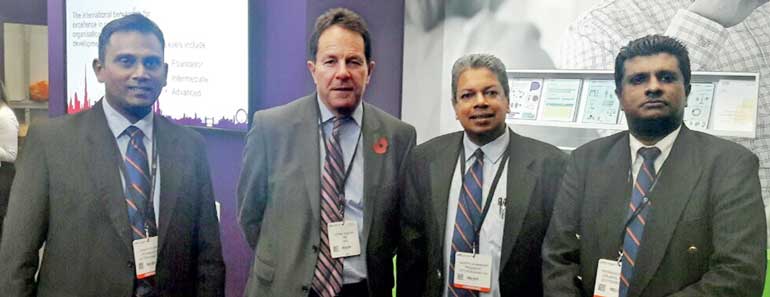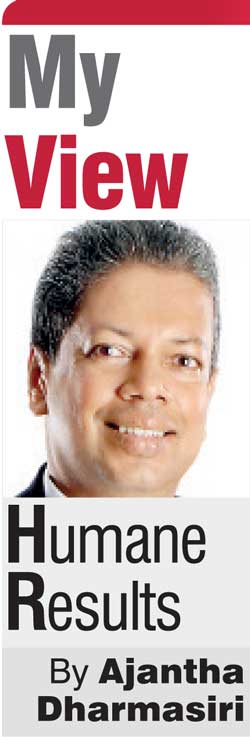Wednesday Feb 25, 2026
Wednesday Feb 25, 2026
Monday, 13 November 2017 00:00 - - {{hitsCtrl.values.hits}}
I had the opportunity of participating in one of the largest HR conferences in the world last week. The 70th annual conference of the Chartered Institute of Personnel and Development (CIPD), UK, was held in Manchester Conventions Centre on 8 and 9 November. Today’s column is a recollection and reflection of the reminiscences of CIPD 2017 conference with the theme ‘Embracing the New World of Work’.

IPM delegates with CIPD, UK CEO Peter Cheese
Overview
The CIPD Annual Conference and Exhibition is the one event in the year that HR professionals around the world look forward to. There were more than 50 sessions on key HR topics with learnings from leading organisations across all sectors with the associated exhibition providing latest HR solutions from more than 180 industry  suppliers.
suppliers.
I attended the CIPD conference representing the Institute of Personnel Management (IPM) Sri Lanka, in the capacity of Honorary President. Priyankara Senevirathe, Chairman, National HR Conference (NHRC) 2018, and Sanath Palliyaguru, a Council Member, were also with me. It is customary for CIPD to invite the IPM President and other delegates on an annual basis.
Key theme
According to CIPD, the digitalisation of work, the impact of technology on jobs, the macro socio-political changes around us, and the increased pace of organisational transformation are examples of a new world of work that is already upon us. As such, a new world which presents major challenges and opportunities for business leaders and the people profession is around us.
With a compelling call for action for organisations, leaders and professionals to champion good work and more ethical decisions, the conference programme was intended to empower the participants to become a driving force for the good of organisations, individuals and the wider society.
Through a wide variety of topic areas and learning formats, the conference provided an opportunity to look at how we need to change and modernise our people practices not only to succeed in a new reality of work, but also to shape a fairer future that will benefit everyone.
Highlights
CIPD CEO Peter Cheese welcomed the gathering in highlighting the key features of the event. “At the CIPD, we have great ambitions to build a profession for the future,” said he. “This year’s event pulls together the practitioners and thinkers who are already leading the way, to help us all shape that future.”
He further went on to say: “You’ll find sessions providing insight on the contextual factors shaping our world of work, together with sessions looking at how to develop evidence-based HR strategies that deliver real business value. You’ll also find practical guidance on maximising the capabilities of your own HR and learning functions, alongside cutting edge thinking and practice which draws on the latest in the science of human behaviour.”
“These are exciting times for the profession globally,” he added. “Whatever you’re looking for, we have something for you – from practical case studies to big-picture context, or from the inspiration to build your capability, to the science that will shape the future of our profession.”
An inclusive digital world
Baroness Martha Lane-Fox, the founder of lastminitute.com and currently serving on the main Board of Twitter, was the keynote speaker. As she elaborated, “We are in an age of marvellous technology but also of staggering incomprehension. We rely on technology for almost everything – our banks, our healthcare, our transport – but we have no idea how it might work or how to hold it to account.”
Martha touched upon the importance of inclusion in the digital world – from access to the internet in order to apply for jobs; developing digital understanding in an age where millions of people don’t have basic digital skills; and how we must all demand a fair, ethical and sustainable digital future that can be a force for good for everyone.
The speech also highlighted the digitalisation of our lives and the responsibility of organisations the importance of modernising our practices to enable an ethical and digital future for all the role of digital understanding and accountability to shape a fairer future the path to success through ethical, sustainable, inclusive and responsible technology.
Leading great performance – The classical orchestra experience
As the grand finale of CIPD Annual Conference, Prof. Gernot Schulz and his classical orchestra focused on how leaders can enable optimal performance, and the effect of poor leadership on the end-results. Using the orchestra as an organisational metaphor, Prof. Schulz explored the role of non-verbal communication, purpose, vision and emotions in leading people, teams and organisations to success.
This was my favourite session. Like musicians in an orchestra, people in organisations need to be finely harmonised to work well together and achieve excellence. Music notes, like policies and processes, are nothing but marks on paper which can produce different results depending on how they are executed. The role of leaders is to create the conditions for success – the way they enable cooperation and people interaction will make the difference between mediocre outputs and excellent performance.
With a combination of musical performance and inspirational talk, the closing keynote addressed the crucial role of leaders and the fine balance between guidance and autonomy, the conditions for seamless integration, collaboration and peak performance, the pitfalls of inadequate leadership and its effect on the final results and the importance of leading through emotion, intuition and non-verbal communication.
Salient sessions
Among the salient sessions, popular TED speaker Alexander Betts explored the role of organisations and HR in shaping fairer and more open economies, including: the real social and economic impact of migration on labour markets, the challenges and opportunities of ensuring labour market access to refugees, addressing public anxiety, social inequality and the fear of globalisation. From the Brexit vote to the rise of Trump and the post-factual society, recent socio-political shifts have surfaced major divisions in our society. The potential effects on the world of work are enormous. Restricting international mobility or returning to protectionist economies would have huge implications for organisations and labour markets.
Timandra Harkness, the author of ‘Big Data: Does Size Matter?’ raised provocative questions about several timely issues. In the age of big data, algorithms can help with everything from recruitment to employee happiness. Overcoming human bias, providing constant feedback and revealing the insights hidden in our behaviour are just a few of the promises new technologies make. But where does this leave the human in human resources? Should people skills be relinquished to machines? She concluded that however much the advances artificial intelligence (AI) will make, human judgment will still be the key differentiator in crucial matters.
(Prof. Ajantha Dharmasiri can be reached through [email protected], [email protected] or www.ajanthadharmasiri.info.)
The need for moving from transactional to strategic HR to add value to a business was aptly emphasised in the conference. Automating the repetitive and administrative tasks of transactional HR will free up our time to focus on enhancing the quality of your work, and positioning HR as a real strategic partner to our businesses. But how do we do it in practice? There were several case studies in this session that offered practical insight into the challenges with transitioning to a strategic HR approach, exploring and adopting new HR technologies that suit your organisation and facilitating change and using current results to anticipate the future strategy.
Should we fear AI and automation? This was another interesting issue that was meaningfully deliberated during the conference. The world of work will continue to change significantly due to automation and artificial intelligence over the next generation. What organisations and people traditionally have done will not be the same in the future. Should we be excited about what’s coming, or should we fear it? These were the questions that were answered with more emphasis on the causes for optimism as AI becomes more integrated into our working lives, if we are socially, economically or morally prepared for what the future brings the measures we need to take to prepare for the AI and automation revolution.
Creating an organisational culture that supports flexible working was the topic of another interesting session. Encouraging flexible and remote working can enable organisations to become more agile and better respond to the needs of their people. But how do we introduce flexibility and manage our culture effectively to avoid the ‘always switched on’ syndrome, while increasing outcomes? Based on several case studies, the session elaborated as to how to assess your organisational and people needs to find the right approach for your business, address the positive and negative consequences of flexible working to employee well-being and create the right culture to make flexible working a success.
Way forward
Having experienced the features of a global HR conference, it is pertinent to reflect on the relevance to Sri Lankan organisations. We are also in the middle of digital transformation in many business sectors with the needed human talent being high in demand. The increasingly strategic role of HR professionals is slowly becoming significant in Sri Lanka. We need to develop HR leaders with global reach and local roots. They should guide us to embrace the new world of work.